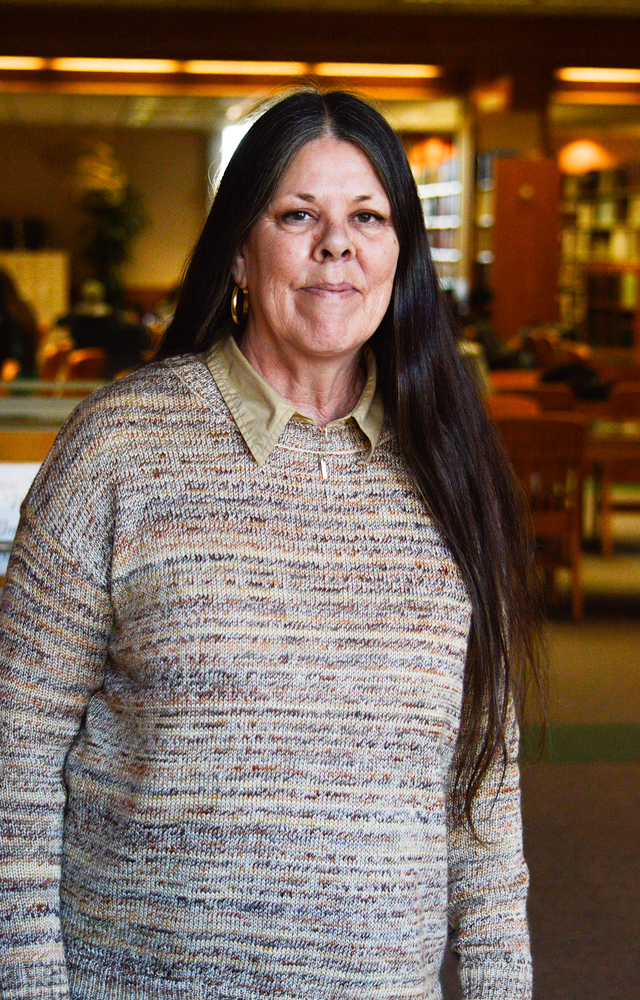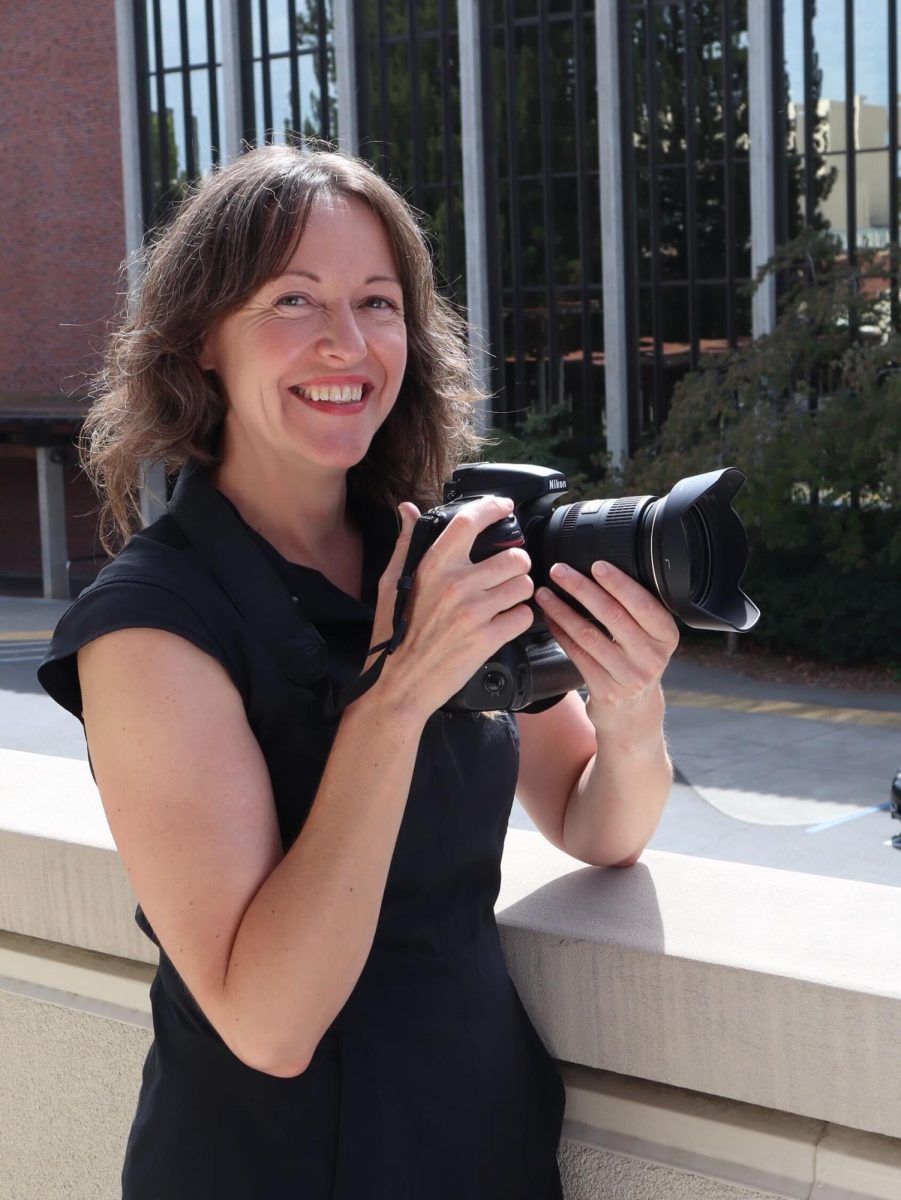It’s a chilly November day at the Leland Stanford Mansion, and all is quiet but for the sound of her voice, which is calm and authoritative, and the crunching snap of her pruning shears as she tends to the roses.
Unsurprisingly, one of her favorite topics is gardening. The other favorite is a decidedly less common one: immunology.
Loreen Willenberg, formerly the owner of her own thriving landscaping business, is now a City College bioethics major at the age of 60. How this came to be is part of two of America’s ongoing stories—HIV/AIDS and corporate exploitation.
Willenberg is HIV-positive, but totally asymptomatic—without benefit of HIV medication. It turns out that she has an extremely rare genetic endowment – Willenberg is one of only 1,725 HIV-positive people in the world whose genes appear to control progression of the infection. Altogether, she has five of the seven such disease-controlling genes so far understood. One of these genes is a mutation that allowed Northern Europeans to survive the Black Plague.
Like the flowers she tends so lovingly, Willenberg is blooming with health.
“I center myself with gardening, says Willenberg, as she bends her tall form carefully over her thorny “babies.” her voice low and a bit husky. “That’s very therapeutic for me, and I’ve done that both personally and professionally all my life—worked with plants, worked with Mother Earth.”
Willenberg describes herself as a very grounded person – grounded in her beloved Mother Earth. Her intuition is clearly powerful as well – she first knew she was HIV-positive as the result of a dream.
“I do nothing special,” says Willenberg. “I just live a good life. I enjoy eating well and living well.”
And she looks it. She has long, shining brown hair salted with gray, and a figure women years younger would be happy to own. You’d never guess this woman had been given a “death sentence” – not once, but twice. In 1980 she was told she had Level 5 cells in her Pap smear – advanced-stage cervical cancer.
“I jumped straight into self-education mode,” says Willenberg, who says, like most women of her generation, she didn’t grow up planning to work with the sciences but to be a housewife. “I read all the books I could find and talked to people.”
Her response to HIV was the same. She was also fortunate to have her Stanford-educated and highly experienced physician, referred to her by Project Inform.
Willenberg – a dynamic, self-motivated woman – has also created the Zephyr Foundation, with the aim of connecting LTNPs and “HIV controllers” like her – people who have never had measurable viral loads of HIV — with one another and with those conducting research.
Of course, the National Institutes of Health and America’s top universities have been wild to study people like Willenberg. She has participated in 13 clinical trials, and generously donated myriad different bodily tissues. Harvard has immortalized her cell lines for research purposes.
But then she read the book that led her to her life’s new purpose. Rebecca Skloot’s 2010 book “The Immortal Life of Henrietta Lacks” details how cells taken from Lacks – without her knowledge or permission—are used worldwide to study and treat numerous conditions. At enormous profit, but none for Lacks or her family.
“Never has one book had such an impact on me,” says Willenberg. “It changed my life’s direction.”
And that’s where her interest in bioethics began. Genetic engineering, cloning, stem cell research and other biological technologies. All raise serious ethical questions. Among them: Do we own the rights to our own cells?
Willenberg thought she and others like her were serving science, and this they were glad to do. And if enormous profits grow from their tissues, surely the participants will share in this bounty, right? No. They’ll never see a nickel.
Research subjects sign waivers, ostensibly to protect researchers against lawsuits. But, in deliberately confusing language, they strip those signing of any share in the proceeds.
The linchpin of these waivers is informed consent. The subject must be told exactly what they are signing—or signing away. But as Lacks’ family and later Willenberg discovered cooperate interests such as powerful institutions and drug companies hold all the cards.
“It’s not right that the human being is cut out of the loop,” says Willenberg firmly. “The rights of experimental subjects are being deliberately taken from them. That has to change.”
People like Willenberg will be integral to finding a way through this emerging realm. She’s not only strong in herself, she’s a powerful advocate for others.
“She’s a crusader,” says LeeAnn Willenberg, Loreen Willenberg’s sister. “She’s dedicated to what is positive for society.”
Not just society at large—she’s supportive and encouraging to fellow students.
“She’s not just a student, she’s become a friend,” says Nick Diehl, a City College philosophy professor whose course Willenberg is currently taking. “She’s wonderful to have in class. She’s a great facilitator for other students.”
Diehl’s affection for Willenberg is plain. He speaks appreciatively about how she draws out other students, helping elicit their thoughts on class topics.
“Most of our students are encountering these subjects for the first time,” says Diehl, who at 40 is a generation younger than Willenberg. “When someone like Loreen comes into your classroom with their wealth of experience, who can also help draw theirs out of them, it’s just amazing. She’s fantastic.”
Willenberg tutors students and works in the Library Resource Center while she completes her undergraduate studies. Her goal is a doctorate in bioethics, and advocacy work within that field.
And when she gets there, look out N.I.H. Watch out Harvard and drug companies. You had better duck. Because Willenberg and people like her – well-rounded and well-informed — are helping to usher in a new age of ethical medicine and drug development, one responsible and responsive to us all, not just to the stockholders, bureaucrats and venture capitalists.





































